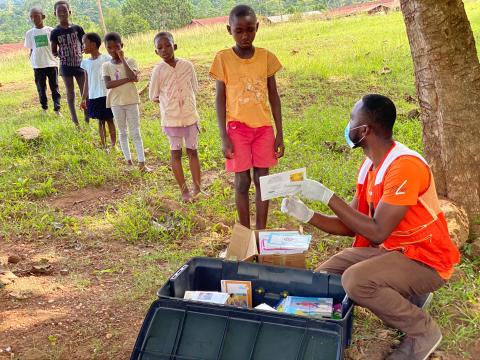Transformational reading camps restore hope in the midst of COVID-19

Children are among the most vulnerable persons prone to be gravely affected by any form of disaster. In most disasters, they are often left unattended to, without protection, and denied their fundamental human rights. The COVID-19 outbreak has put many children across the globe in this vulnerable state.
In Adjeikrom, a community in World Vision's Fanteakwa Area Programme in Ghana, eight-year-old Hannah explains how the closure of schools has affected her. She says, “I like to go to school and listen to my teacher read to us. I like to play with my friends at school and in the reading camps. But because of coronavirus I cannot do all of these things. I am always alone at home, especially when my parents go to the farm.”
Already, many children in the Fanteakwa Area Programme have weak basic foundational learning skills. This includes reading, solving simple math and language, among others. It is often in schools that children develop these skills. But now that schools have been closed, there is risk of regression. The government of Ghana has established a number of interventions to curb the long-term impact of school closures. These interventions include the broadcasting of lessons on radio and TV, and online learning platforms. However, many children like Hannah, who live in the rural parts of the country and do not have a TV at home and whose parents cannot buy gadgets with which they can access online learning platforms, are at a disadvantage.
"We don't have a television at home. Even if we had, because we are not connected to electricity we cannot watch the programmes on TV. Sometimes I visit my friend's home to watch but we are often not allowed to. Their parents are also afraid of the virus so they don't allow us to come to their homes anymore."
To help improve the situation, World Vision's Reading Improvement in Primary Education (RIPE) project, is leveraging its Unlock Literacy project model to provide children within the Fanteakwa Area programme age-appropriate reading books written in their local languages.
The project has set up 33 reading camps in 21 communities. Each reading camp has a book bank from which children periodically borrow books to read. Children visit the book banks to borrow books to read at home. Since the closure of schools, the project has distributed over 16,000 storybooks with 140 different titles, borrowed by over 1,200 children every week.
Hannah expresses her excitement about World Vision's interventions through the book banks. She says, "I am always happy when I go to the book banks to borrow books. I get to pick storybooks with nice pictures to read to my siblings at home. Our facilitators also talk to us about the virus and what we can do to protect ourselves."
As an organisation, World Vision believes that for the most vulnerable children, education is lifesaving. Not only does it provide safety and protection, it also instills hope for a brighter future.